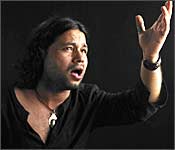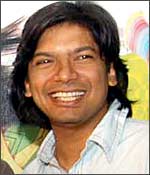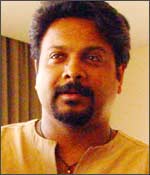Musical collaborations between India and the West are on the upswing.
On his way to Mussoorie, singer Kailash Kher recently made a brief stop in Delhi. Besides talking about his various live shows and recordings, jingles and forthcoming songs, he mentioned Eddie Vedder, Pearl Jam's lead singer, and said that they would be collaborating on a project for a forthcoming event. It's the first time Kher is partnering an international artiste.
"I had received many offers earlier, but since I liked what Eddie had done with Nusrat Saab (Nusrat Fateh Ali Khan) for the film Dead Man Walking, I finally decided to take the plunge."
The collaboration will entail a live show in New York City at Carnege Hall where the two of them will pay tribute to the late musician. "We will be jamming together on stage, singing some of our respective compositions together, besides singing Nusrat Saab's compositions."
 If Kher is gearing up for this brand new collaboration, director-choreographer Farah Khan [Images] will soon be busy rehearsing with
If Kher is gearing up for this brand new collaboration, director-choreographer Farah Khan [Images] will soon be busy rehearsing with
Shakira [Images] and getting the latter to shake her hips in Bollywood style for a forthcoming gig in New York.
While Shakira's trademark belly dance will remain, Khan will not only audition some other dancers but also teach Shakira some contemporary Indian dance steps in just three days.
Going by the rumours floating in the industry, Shakira may end up returning the favour by doing a special number with Shah Rukh Khan [Images] for Farah's forthcoming directorial venture.
Incidentally, Farah has earlier worked for a Chinese film Ru Guo besides Andrew Lloyd Webber's Bombay Dreams.
While Kher and Khan are grabbing headlines for their collaborative attempts with their Western counterparts, it's a trend that started way back in the 1960s with Pandit Ravi Shankar and the Beatles getting together to marry Indian classical sensibilities with Western melodies. Today, the journey still continues.
"But it's no fun, to be completely honest," says Shaan, who has worked with international artistes Mel C and Blue in the past. Globalisation and technology, he feels, has hindered the very concept of music collaboration.
"Thanks to technology, I end up recording my parts here, while the other artistes record their work in their country. So where's the interaction for the so-called partnership?" he asks flatly.
For his previous album, Shaan collaborated with popular boy band Michael Learns to Rock for a song, Take me to your heart. Similarly, One Love, a song with Blue, was originally written with the 9/11 attacks in mind.
 The song became an instant hit when Abhishek Bachchan [Images] lip synched the song in Rakht. Shaan's recent work on Marigold, another Indo-British film starring Salman Khan [Images], has charted the same route.
The song became an instant hit when Abhishek Bachchan [Images] lip synched the song in Rakht. Shaan's recent work on Marigold, another Indo-British film starring Salman Khan [Images], has charted the same route.
"This is the age of telephonic partnerships and Internet collaborations where you don't have much interaction," Shaan adds.
Turkish-born and London-resident percussionist Numan Elyer thinks otherwise. "You take your own culture wherever you go," he explains,"but you also add to your culture by learning from others." Following collaborations with Indian musicians, Elyer travelled to India to study tabla, and ended up using tabla techniques in his own darbuka -- a traditional Turkish instrument -- playing.
Elyer was part of Rhythm Sticks 2006, a musical fest held in London [Images] earlier this year, that bought together Indian, Turkish, Korean, Indonesian and Japanese musicians.
Listening to Toufiq Qureshi (who was jamming with a British DJ there), Elyer feels Indians are the best percussionists. Also performing at the festival were brothers Amaan and Ayaan Ali Khan who collaborated with percussionist Evelyn Glennie.
"We have collaborated with international artistes in the past, though we've never consciously sought it," says Ayaan.
"We had been receiving offers to collaborate with international artistes for a long time, but we knew we first needed to be recognised in our own country," says Ayaan, who along with his brother has had musical tie-ups with Matthew Barney and Derrick from Allman Brothers band.
"With the world becoming a global village it is obvious that such creative partnerships won't be exclusive anymore."
Kher, on the other hand, feels musical collaborations with international artistes are a great starting point to look at a global audience. "At this stage of my career, I'm happy to be associated with an international artiste of repute. It is good exposure and while I can learn from Eddie, he too can learn a thing or two from me."
Perhaps one of the best examples of a musical collaboration is that of the fusion band Remember Shakti, a successful attempt by guitarist John Maclaughin, still going strong after nearly three decades.
Interestingly, a number of festivals like the Savvanah Fest, Rhythm Sticks and Stanford Pan Asian fest are trying to help Indian and Western artistes collaborate.
The trend is also veering towards films like Bluffmaster [Images] and bringing an ensemble of international artistes to provide music for Hindi films.
 Music director Sandeep Chowta recently completed a collaborative album, American Pilgrimage, featuring jazz artistes like John Scofield, Bunny Brunel, Dave Valentine and Jay Oliver. Incidentally, Oliver gave the lounge version of Chowta's hit single Mallika I Hate You.
Music director Sandeep Chowta recently completed a collaborative album, American Pilgrimage, featuring jazz artistes like John Scofield, Bunny Brunel, Dave Valentine and Jay Oliver. Incidentally, Oliver gave the lounge version of Chowta's hit single Mallika I Hate You.
A majority of musicians feel that for collaborations (especially during live shows) to succeed, one needs to give respect to the music that their Western counterpart brings on stage.
"I know of some partnerships that have flopped almost immediately on stage because some Indian musicians show off their skills and repertoire and insult the other artistes on stage."
Chowta too had recently admitted in one of his interviews that "musicians in the West are hesitant to work with us until they're convinced that we really understand their music."
Kher laughs at these statements. "The West is leaning towards the East for musical support. I'm tempted to show my skills. Take it or leave it."
We'll take it.
Powered by 
 If Kher is gearing up for this brand new collaboration, director-choreographer Farah Khan [Images] will soon be busy rehearsing with
If Kher is gearing up for this brand new collaboration, director-choreographer Farah Khan [Images] will soon be busy rehearsing with The song became an instant hit when Abhishek Bachchan [Images] lip synched the song in Rakht. Shaan's recent work on Marigold, another Indo-British film starring Salman Khan [Images], has charted the same route.
The song became an instant hit when Abhishek Bachchan [Images] lip synched the song in Rakht. Shaan's recent work on Marigold, another Indo-British film starring Salman Khan [Images], has charted the same route. Music director Sandeep Chowta recently completed a collaborative album, American Pilgrimage, featuring jazz artistes like John Scofield, Bunny Brunel, Dave Valentine and Jay Oliver. Incidentally, Oliver gave the lounge version of Chowta's hit single Mallika I Hate You.
Music director Sandeep Chowta recently completed a collaborative album, American Pilgrimage, featuring jazz artistes like John Scofield, Bunny Brunel, Dave Valentine and Jay Oliver. Incidentally, Oliver gave the lounge version of Chowta's hit single Mallika I Hate You.